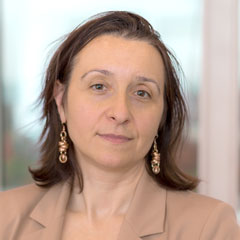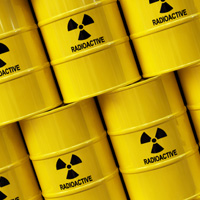Francesca Giovannini, Executive Director of Managing the Atom at Harvard University’s Belfer Center, is leading the Research Network on Rethinking Nuclear Deterrence. She discusses the goals of the network and new ways of working and thinking about nuclear risk with Senior Program Officer Angela Schlater.
Angela
When I first approached you about this idea last year, MacArthur’s goal was to develop a body of research that seeds new thinking to challenge nuclear deterrence theory as the predominant lens through which we view nuclear weapons strategy. Since then, you have invested time and thought into what this research network will look like.
At this point, what are your most important goals for the research network?
Francesca
The biggest goal for the research network is to explore, study, and, where possible, challenge the theory of nuclear deterrence. I want to emphasize the word “theory” because for too long, we have treated nuclear deterrence either as a “matter of fact” that cannot be questioned or as an ideology that should not be challenged. Neither of these approaches is right.
Deterrence theory became the most prominent theory of the Cold War because of specific social, economic, and political forces. By approaching nuclear deterrence as a theory, we open space for examination and exploration of other theories that might be equally important or more important in the current geopolitical context.
Another goal of the network is to elevate the credibility of alternatives to deterrence theory. Nuclear disarmament is the most prominent one, of course, but it is not the only one. Scholars around the world have advanced numerous proposals—from cooperative security frameworks to defense ideas and beyond—that could be re-explored and re-examined. Most importantly, we need to understand what systemic factors have continued to impede these alternatives.
To achieve this, the research network will need to tap into other fields and non-Western thinking. For example, the Global South has always been eager to expand our understanding of security beyond hard security. Questions related to development, human rights, and sustainability are much more central to the debate in most of the countries around the world. It is time to ask: what can we learn from these countries? What alternative frameworks for national regional and global security might these countries want to see? And what could be the middle ground between our hard security demands and their development needs? By expanding the discussion of nuclear weapons, we can tap into lessons from other fields like climate change and social justice. This is something we have missed previously.
I am curious what you found most exciting?
Angela
I am excited about approaching this question academically, with rigor and openness. And I am interested in how the network plans to look at nuclear weapons through a variety of lenses, not just the Western, patriarchal lens of the military industrial complex, but also non-Western lenses.
The intersectionality of this issue with other important issues like climate change and social justice also feels important. I think one opportunity we have with this network is to really demonstrate how nuclear weapons effect everyone.
What about you? What element of the research network excites you most?
Francesca
I’m most excited by the fact that this research network is coming at a very interesting historical moment where we can learn from other fields that are facing their own crises.
For example, just a few months ago hundreds of scientists convened in Indonesia for the Global Platform for disaster preparedness. At that meeting, hundreds of scientists rejected the concept of sustainable development as an instrument of the Global North to continue to promote mass consumption and avoid making painful political and social adjustments to protect the environment.
This is very comparable to the situation we face with nuclear weapons today. A global movement is emerging to challenge and question even more forcefully than before the assumption that nuclear weapons afford the ultimate protection. This is a movement composed of scientists, human rights activists, and young people who are determined to make profound changes for the benefit of our human community and future generations. Many years ago, such a rebuff would have been unthinkable. Today, scientists around the world, thanks to the urgency of climate change, are finding a unified voice and can play a fundamental role as global advocates for a more inclusive, just, and sustainable world. These voices are also emerging in our field.
The timing is right in other ways. This research network comes at a moment where the United Nations (UN) member states are thinking about UN reform. In 2023, the UN Secretary General will present new proposals for the reform of the UN and could, for example, propose giving more decision-making power to the UN General Assembly rather than the UN Security Council. So, our efforts will happen at the same time other movements are pushing for greater democratization and pushing toward thinking differently about humanity.
Angela
I am glad you raised the timing of launching this research network. As we all know and are acutely aware, the crisis in Ukraine has elevated nuclear weapons in the public consciousness more than other events of the recent past. With so much of the public viewing nuclear weapons right now as a threat, how has Ukraine changed, or not changed, how you are thinking about nuclear policy? And what are some of the related questions that the network might address through your research?
Francesca
My biggest concern is that the nuclear community will draw the wrong lessons from Ukraine.
I think the Ukraine war really needs to be looked at from the perspective of non-nuclear weapon states, rather than exclusively from the perspective of U.S. security, NATO security, or the security of nuclear weapons states. The Ukraine war, to me, is a clear example of what happens in the world when nuclear weapon states act in predatory ways and use nuclear weapons coercion to upset and destroy shared norms and values of the international community. What remains after is chaos and anarchy and a profound sense of uncertainty and fear.
So, the very first question we need to ask is what kind of protection can be given to non-nuclear weapon states? What legal protection can be given to the majority of countries in the world that have rejected nuclear weapons? That should be the world’s first—and most important—question.
The danger is that we go toward further militarization because we believe that China will follow in the footsteps of Russia and will try to do to Taiwan what Russians have done to Ukraine. But the answer should not be militarization; the answer should be building greater security and stability for both nuclear and non-nuclear weapon states.
This is also a moment to consider what kind of institutions need to be developed in the future. What kind of diplomacy should be established to mediate and negotiate crisis where there is a nuclear aspect? Who are the authorities that can negate a nuclear crisis?
Finally, I think there is a very important question here about accountability. We have seen, for example, language over nuclear threats become a simplistic and blasé. We have seen it from the Trump Administration and now from Putin. Nuclear weapon states today deliver massive nuclear threats to the world in an almost casual way.
How are you and the MacArthur Foundation approaching the crisis in Ukraine and what it means for nuclear policy?
Angela
Like you, we are outraged by Russia’s brutal war in Ukraine. Alongside our grantees and partners, we are also deeply concerned about the nuclear implications of the conflict. From February 2021 through June of this year, we have invested tens of millions of dollars in the nuclear field, which will be paid out through the end of 2023.
In addition to this support, our Board approved roughly $5 million of funding Foundation-wide to help meet specific needs at the outset of this crisis. This included support for the International Crisis Group’s critical work on the Iran Nuclear Deal, which was on the brink of collapse in the early days of the war even as the conflict highlighted why nuclear threats are so vitally important.
And, just as you mentioned that this is an important moment to talk about deterrence theory, Ukraine is also highlighting how important this moment is for another part of the Nuclear Challenges capstone. We have invested part of our capstone in grantees who are leading at the nexus of nuclear and climate risks. Our grantees are working to mitigate the security implications of nuclear power’s expansion as a climate solution, and we are seeing exactly how important this is as the Zaporizhzhia nuclear power plant has come under attack in Ukraine.
The final topic I wanted to ask you about is collaboration. Can you talk about how the research network will foster collaboration?
Francesca
I am really excited about the opportunity the research network has to question the way we work together on nuclear issues. For many years, we tended to work in isolation from one another, and we tended to think in very restricted ways about nuclear deterrence. For example, in recent times, the nuclear community has seldom connected questions about nuclear deterrence with other big issues, like questions of ethics, justice, or responsibility to non-nuclear weapon states. The research network will foster collaboration across institution and across questions, and we hope this will generate synergies that we have never seen before.
The network will also try to challenge the ideological positioning of people in the nuclear community. We are composing working groups that bring together people who believe in nuclear deterrence and people who do not. We want nuclear disarmament advocates to think about mitigating the risk of nuclear use, and we want advocates of nuclear deterrence to think about alternatives. This has never been done before, but it is needed because solutions will only come in the grey areas in between these two extremes.
We also want this research network to be intergenerational. A common problem with intergenerational dialogue is that older generations frame the question and then ask the new generation to address it, but this needs to be reversed. How do newer generations frame the question, and what kind of answers can we get? This dynamic will characterize the research network. It is going to be unique.
Angela
Thank you, Francesca, for this wonderful conversation. I am looking forward to seeing and sharing the research that you and your colleagues produce over the next couple years.





